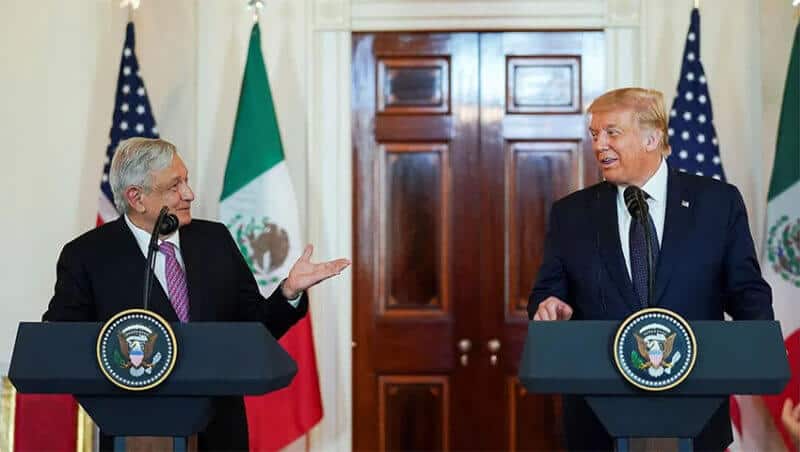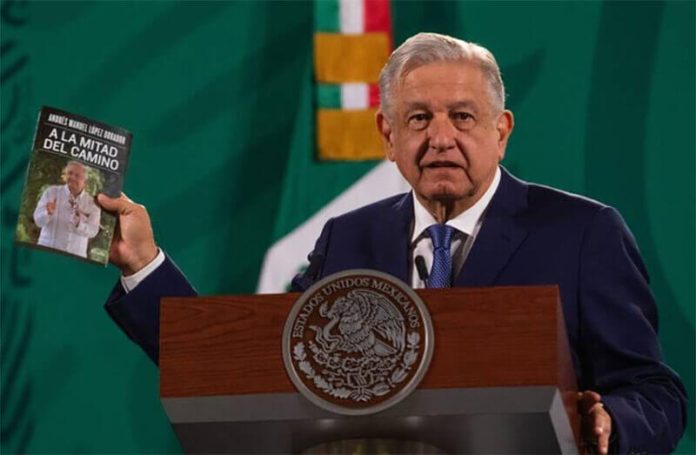After appearing at lengthy press conferences every weekday morning for almost three years, one could rightly think that Andrés Manuel López Obrador has had ample opportunity to outline his vision for Mexico and express his opinions and ideas on a wide range of issues and people.
But that didn’t dissuade the president from penning a new book – his 18th – to set out his thoughts and praise his government’s achievements in the first half of its six-year term.
But does A la mitad del camino (Halfway There) contain any new insights into AMLO, the man and omnipresent leader, or offer any new, hitherto unknown information about his political achievements, ideals and objectives? For the most part, the answer is no.
Reading much like one of the president’s early morning monologues (or one his more formal addresses to the nation), López Obrador’s 320-page book goes over well-trodden ground, outlining his thoughts on subjects such as the need to combat corruption, the depravity of the neoliberal period (defined by AMLO as the 32 years before he took office), media bias, the quest for energy self sufficiency and the crusade to transform Mexico.
In his opening chapter, called “The Present,” which mainly outlines government achievements, the president’s trademark optimism – even when there is not much to celebrate – and indefatigable capacity for self-praise shine through.
With regard to the pandemic, for example, which has claimed more than 277,000 lives in Mexico, AMLO declares that there is nothing more his government could have done to prevent deaths, even though it never enforced a strict lockdown, didn’t test widely as a means to control the spread of the virus and advocated only reluctantly for the use of face masks.
The economy was in recession even before the pandemic but the nation’s poor are receiving more government benefits, López Obrador writes, ignoring evidence that shows that poverty worsened in 2020.
AMLO moves on to foreign relations in the book’s second chapter, whose title – “Respect for the Rights of Others is Peace” – is a famous quote by former president Benito Juárez, one of the president’s political heroes.
The bulk of the chapter deals with what López Obrador calls his “surprising relationship” with former United States president Donald Trump and Mexico’s decision to grant political asylum to former Bolivian president Evo Morales.
It is perhaps here that even the most diligent students of Mexican politics will encounter some new insights as AMLO gives readers a painstaking call-by-call account of the 10 telephone conversations he had with Trump, and takes them inside his visit to the White House last year and trade negotiations with the United States prior to the signing of the new North American free trade agreement, the USMCA.
Official correspondence the two leaders sent each other, and a transcript of AMLO’s address at the White House in July 2020, augment the Trump subsection of chapter 2.

The second half of the chapter is dominated by an army account of the mission to pick up Morales in Bolivia and bring him to Mexico.
“Evo said we saved his life; I thought the expression was just a gesture of gratitude for our solidarity but when the defense minister gave me the report about the details of the operation I realized the great risk they ran. I invite you to read the report [which unfolds across 29 pages of A la mitad del camino] about the Bolivia mission and judge for yourself,” AMLO writes.
After presenting the federal government’s Ethical Guide for the Transformation of Mexico in his third chapter – “The opposition” – the president goes on the attack, taking aim at business leaders, “the conservative press,” unscrupulous journalists, opposition politicians and “intellectuals of the old regime,” among others.
It’s in this section that the book is most reminiscent of AMLO’s mañaneras, as his morning pressers are known, with the president showing he can be just as pugnacious with the written word as he is with the spoken one.
“Like all the oligarchs of the world, Mexico’s business leaders like money. … With [some] exceptions they are usually swindlers and hypocrites,” he writes.
“… In addition to being the most tenacious defender of neoliberal policy … and the corruption of white-collar criminals, [the newspaper Reforma is] the most conservative and doctrinal newspaper in current times.”
In the fourth and final chapter AMLO looks to the future, lingering on his plans for the energy sector, the potential of the country’s south and southeast and the opportunities created by the USMCA.
He evens finds the opportunity to insert some lines of poetry by Cuban Revolution hero Ernesto “Che” Guevara in which he extols the virtues of Palenque, an ancient Mayan city in Chiapas.
“The Mayan cities of Comalcalco, Pomoná, Reforma, Santa Elena, El Tigre, Edzná, Uxmal, Chichén Itzá, Ek Balam,Cobá,Tulum, Tikal, Copán, Piedras Negras, Yaxchilán, Bonampak, Kohunlich and Calakmul, among many others of great cultural, historic and artistic value, are also beautiful,” López Obrador subsequently writes, showing off his encyclopedic knowledge of Mayan archaeological sites in Mexico and Central America.
In a similar fashion, AMLO enumerates achievement after achievement throughout A la mitad del camino (Editorial Planeta, 2021) while taking great pains to leave readers in no doubt that the contemptible governance of yesteryear has been left behind and a transformation of Mexico is in progress.
A selection of notable quotes from the book (published in Spanish), the president’s second since he took office in December 2018, appears below.
![]()
On Mexico’s potential:
“[Before the current government took office] we reached the conclusion that the possibilities for change were greater than those of stagnation and decadence.”
On the government’s investment in infrastructure:
“In our government, after a long period of neoliberal policy, we restarted the execution of infrastructure projects with public investment. With the federal budget, without taking on debt and without delivering concessions [to private companies], we’re building highways, dams, hospitals, universities, schools, aqueducts, drainage systems, wastewater treatment plants, bridges, refineries, railways, power plants, airports …”
On the pandemic:
“We’ve done everything humanly possible to confront the pandemic and save lives.”
On transforming Mexico:
“… The most important thing is that the bases of transformation have already been set. Just two years and eight months after taking the presidency I can affirm that we’ve already achieved that objective.”
On combating corruption and governing with austerity:
“With this formula of combating corruption and governing without luxuries or frivolities we’ve been able to meet the commitment to not put the country into debt, not raise taxes, not increase fuel prices and most importantly … fund social programs for the wellbeing of our people, especially the poorest and most marginalized.”
On the “conservative press:”
“The conventional media – the newspapers, the radio and television, in other words – has attacked us in a way that hadn’t been done since the times of [revolutionary leader and former president] Francisco I. Madero.”
“… The vast majority of media outlets, with their commentators, columnists, contributors and news presenters, have completely given themselves over to defamation and lies.”
On his relationship with Donald Trump:
“Although a lot voices predicted that ex-president Donald Trump and I were going to clash, our relationship was in fact respectful and constructive for our people and nations.”
On granting political asylum to former Bolivian president Evo Morales:
“On this matter … we were inspired by the example of solidarity … and the teachings of president Lázaro Cárdenas del Río and other revolutionary leaders to protect the lives of those who are persecuted.”
On energy self sufficiency:
“In the energy sector I hope to achieve the objective of ceasing to buy gasoline and diesel abroad and to produce and sell these fuels in the domestic market.”
On Mexico’s south:
“Something strategic that will change the profile of development in our country is the special attention to the south-southeast of Mexico. For decades growth was promoted in the the country’s center, Bajío [region] and north. The great paradox is that this development model rested on income obtained from the extraction of oil in Veracruz, Chiapas, Campeche and Tabasco.”
On the “conservatism” of the middle class:
“The degradation of the middle class worsened in our country throughout the neoliberal period. … Individualism became a way of life and while it couldn’t eclipse everything, it did damage the great reserve of cultural, moral and spiritual values that have been passed on by our ancestral civilizations and conserved by our families and peoples through centuries.”
On tackling violence:
“It may take time to pacify the country but the most certain formula to do so is to attend to the root [of the problem]; not forget young people, for example, don’t leave them without options to study and work in order to avoid them being roped in by organized crime.”
On life after politics:
“I want to conclude my mandate at the end of September 2024 to retire … and live in Palenque with health and happiness for the rest of my life, keeping with me the memories and the sublime satisfaction of having served the extraordinary people of Mexico and our great nation.”
Mexico News Daily
